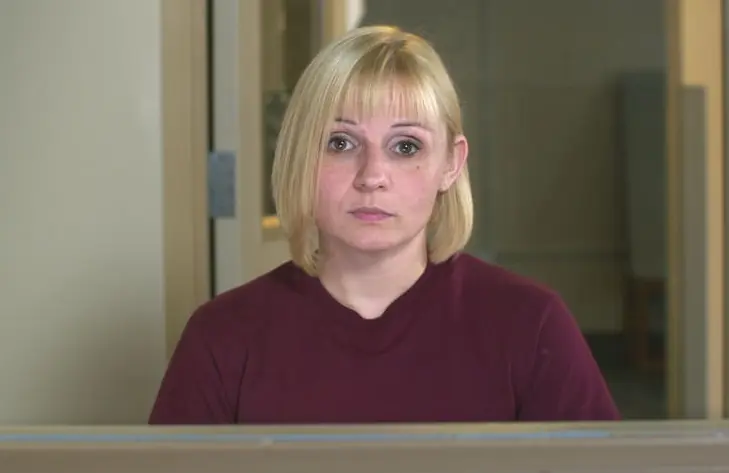Don't Turn Your Back on Season 2 of Netflix's I Am a Killer
-
 Lindsay Haugen in Season 2 of Netflix's I Am a Killer (Photo: A+E Networks UK)
Lindsay Haugen in Season 2 of Netflix's I Am a Killer (Photo: A+E Networks UK)Primetimer editor-at-large Sarah D. Bunting hosts her very own true crime podcast The Blotter Presents, so who better to preview the second season of Netflix's true crime docuseries, I Am a Killer?
You may not have realized that Netflix's I Am a Killer was returning for a second season, because you may not have realized that the show existed. The ten-episode first season dropped in August of 2018, and the summertime release coupled with its vague title did little to distinguish it from the glut of other true-crime fare like Killer Women, Killer Legends, Dream/Killer, and so on. The vague logline — "interviews with death row inmates" — may have have rendered it invisible as you scrolled through Netflix's recommended true-crime titles.
Or maybe you gave it a pass because you're tired of true-crime shows centered on the criminals instead of their victims, fetishizing the killers' "processes" and not confronting the emotional wreckage that murderers leave behind. My own discomfort with this goes back to watching HBO's The Iceman Tapes way back in the '90s, in which Richard Kuklinski, the Gambino crime family's top "hitter," gave an extended interview that became a documentary, which HBO aired endlessly in the ensuing years. I remember finding him fascinating, partly due to his unusual appearance, including a jowly face that seemed to have all the features crammed into 10 percent of his skull's total area. But mostly it was Kuklinski's evident pride in his work — his careful detailing of various methods of murder — that I couldn't look away from, even as my skin crawled. I think there's a perverse appeal for viewers in "facing" killers that way, telling ourselves we can spot their lies, or what makes them tick. To understand them is to believe we can elude them.
But to its credit (and despite its title), I Am a Killer isn't trying to glamorize the death-row inmates who participate, nor does it try to mount a defense for them. Each episode is a relatively nuanced 360-degree examination of the inmate's situation — why he (or, in the second season, she) is on death row, what former cellmates and partners think of them, what law enforcement and prison personnel saw in the crime and everything leading up to it, and how their family and the victim's family have managed in the years since the murders. It's an effective look at the many ripples a killing creates, and the spaces it leaves in multiple lives. It lets family members on both sides share their grief and weariness.
That's not the only issue I Am a Killer subtly takes on. Because it's a European production, there's an underlying sense of bafflement at the United States's continued commitment to capital punishment — Werner Herzog's outstanding On Death Row had this too, more overtly — but there's also a refreshing willingness to present various perspectives, and let the audience draw their own conclusions. Is solitary confinement ever an effective solution for a "problem" prisoner, or does it only make a man like James Robertson more violent and defiant? If drugs and alcohol play this consistent a role in capital crimes, are we ignoring the "rehabilitation" aspect of incarceration at society's peril? If a murderer is also a victim, does he alone bear responsibility for his more monstrous coping behaviors?
I don't have the answers, but I can tell you that I Am a Killer is well worth a look. Watching it isn't going to solve vicious cycles of abuse, the gun-control debate, overly punitive sentencing statutes, or the perpetuation of underclasses by the carceral state, but it's going to put all those issues in viewers' minds and let them percolate without lecturing. Some of the material is difficult, as when an inmate has evident and deep biases that make caring what becomes of him a challenge… and then it becomes clear that that same inmate, despised and beaten by his parents, assaulted by a neighborhood pedophile, drinking at school to numb himself in the third grade, never really had a chance. But I Am a Killer reminds us that even ugly stories with unsatisfying endings can have value and are worth hearing.
Weigh in with your comments about the show in our forums, where we've just created a topic for I Am a Killer.
Sarah D. Bunting co-founded Television Without Pity, and her work has appeared in Glamour and New York, and on MSNBC, NPR's Monkey See blog, MLB.com, and Yahoo!. Find her at her true-crime newsletter, Best Evidence, and on TV podcasts Extra Hot Great and Again With This.
TOPICS: Netflix, Prime Video, I Am a Killer
- “Yeah, I agree”: Reddit argues Stranger Things keeps sidelining Nancy, Steve, and Jonathan for a tired love triangle
- Why is Vecna/Henry scared of that cave? Stranger Things reveals an overlooked weakness tied to the Upside Down
- "Her family is not racist": Love Is Blind: Italy star Parmi defends Gergana amid post-wedding controversy
- Where Are Mary-Ashanti and Djennane From What's in the Box? Now? Details explored